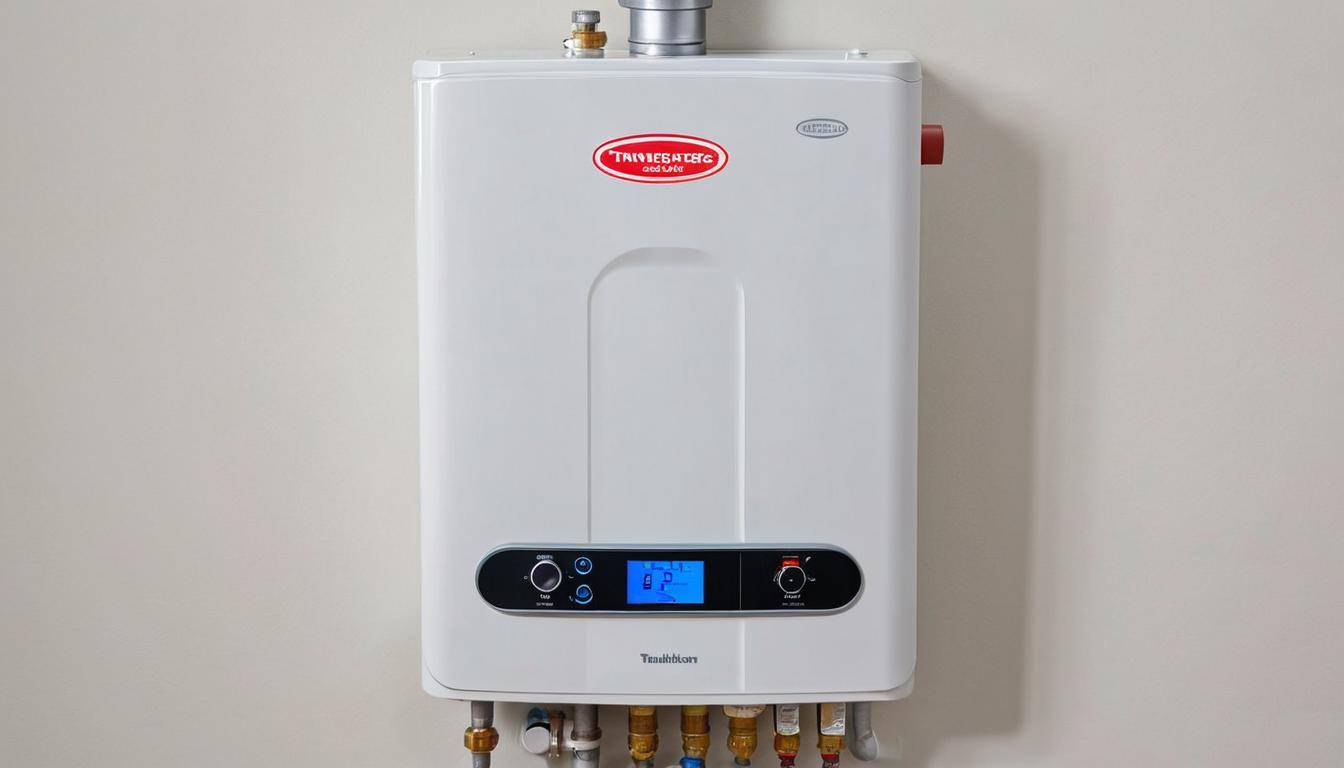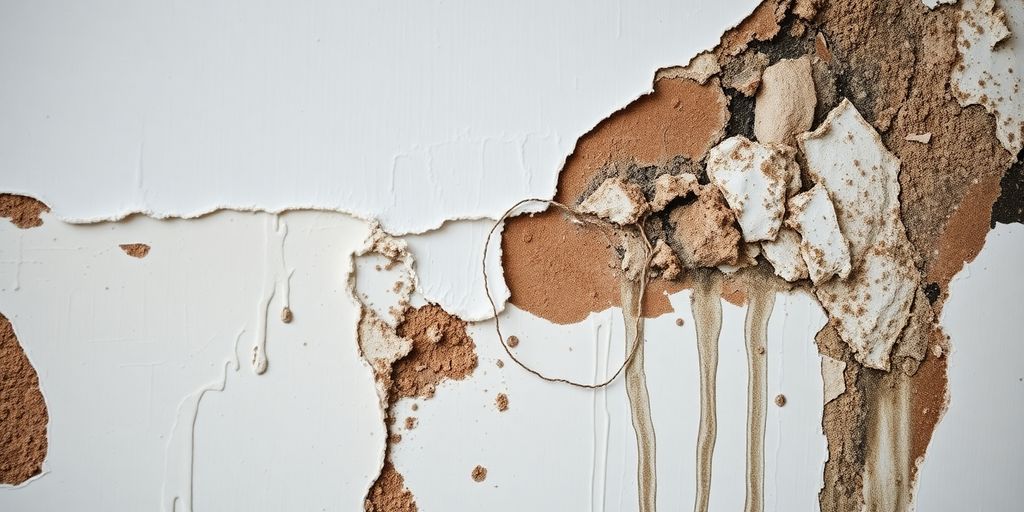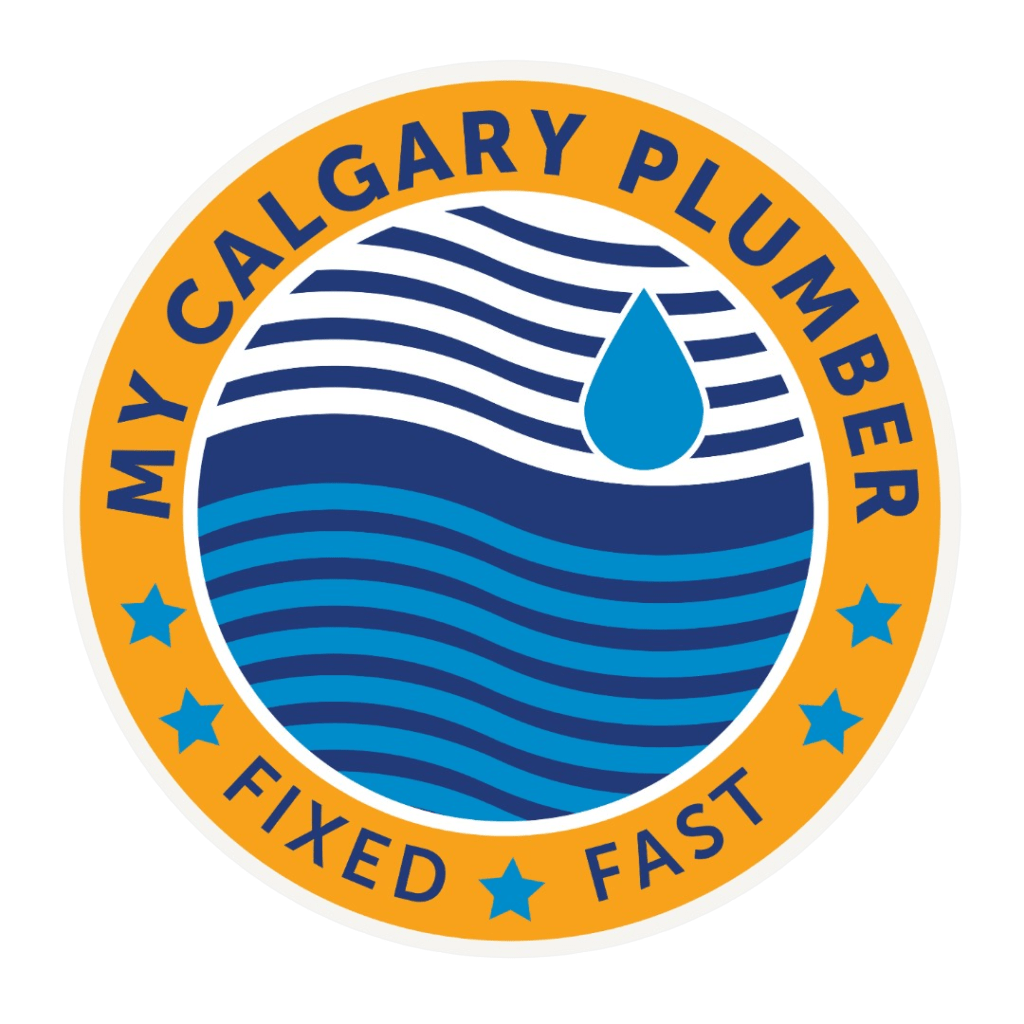Clogged drains can throw a wrench into your meticulously planned day, leaving you searching for effective DIY methods that don’t involve a plumber’s hefty fee. Whether it’s the sink draining slowly or standing water in the bathtub, fixing these nagging issues yourself can be both cost-effective and rewarding.
Exploring alternatives to traditional drain snaking reveals solutions like hydro-jetting with powerful water streams or eco-friendly enzyme-based cleaners that digest organic build-up naturally. These methods not only restore normalcy efficiently but also help safeguard your plumbing system from damage caused by more aggressive techniques. Let’s dive into these practical approaches so you can regain control over your home’s plumbing with confidence.
An effective alternative to drain snaking is using a high-pressure water jetting system. This method involves using pressurized water to clear blockages and build-up within the pipes, providing a thorough cleaning and restoring proper drainage without the need for physical snaking.
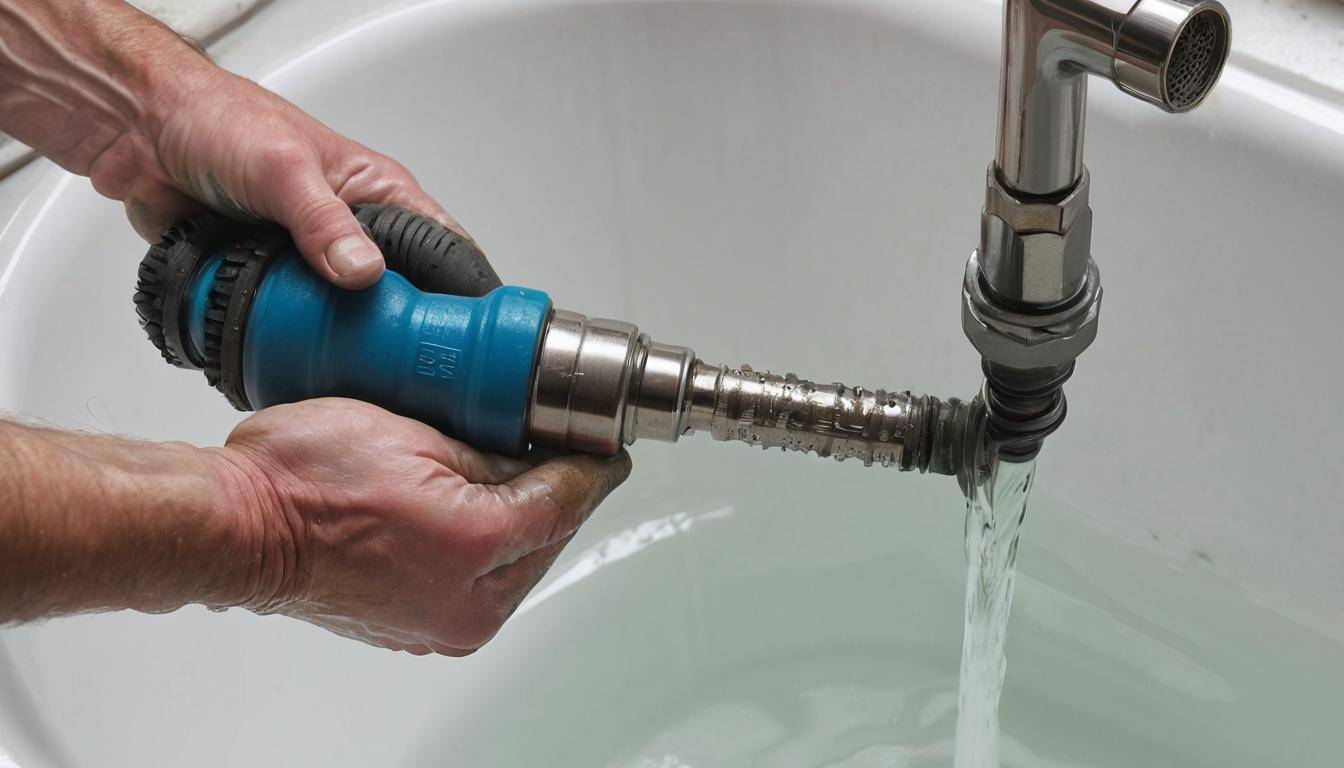
Alternatives to Snake Drains
One popular alternative to snaking drains is hydro-jetting. This method involves using high-pressure water streams to blast away blockages and build-up inside pipes. Think of it as a powerful shower for your pipes. The intense pressure of the water effectively breaks up clogs and removes debris, leaving your pipes clear and flowing smoothly. Hydro-jetting is especially useful for removing stubborn mineral deposits and grease buildup, making it an effective choice for both residential and commercial drain cleaning.
The advantage of hydro-jetting lies in its comprehensive cleaning process, reaching the entire length of the pipe rather than just the area near the drain opening. This ensures that any accumulated debris or grease deep within the pipe is effectively removed. It’s also an environmentally friendly option since it does not involve the use of harsh chemicals.
Enzyme-Based Cleaners
Another effective alternative to snaking drains is enzyme-based cleaners. These cleaners are composed of natural bacteria and enzymes that digest organic matter causing clogs. They are particularly useful for clearing slow drains caused by a buildup of organic materials such as food particles, soap scum, or hair. Enzyme-based cleaners offer a gentle, yet efficient way to break down these substances without resorting to harsh chemical agents.
The natural composition of enzyme-based cleaners makes them safe for use in both residential and commercial settings. They work slowly but steadily over time, breaking down the organic matter causing the clog. Additionally, their environmentally friendly nature makes them an appealing option for those seeking non-toxic and biodegradable solutions.
Both hydro-jetting and enzyme-based cleaners provide effective alternatives to snaking drains that are less labor-intensive and environmentally friendly. For stubborn clogs or professional advice, it’s best to seek assistance from experienced professionals like those at My Calgary Plumber.
With a clear understanding of the non-invasive methods for unclogging drains, let’s now explore a different approach with chemical drain cleaners.
Chemical Drain Cleaners
Chemical drain cleaners can be quite handy when dealing with a clogged drain. They are designed to quickly dissolve blockages, clearing the pipes and allowing water to flow freely once again. There are two main types of chemical drain cleaners: caustic cleaners and oxidizing cleaners.
Caustic cleaners, like sodium hydroxide, work by breaking down clogs through potent chemical reactions. These cleaners are effective at dissolving hair, soap scum, and food particles. On the other hand, oxidizing cleaners, such as bleach and nitrates, use oxygen to facilitate the breakdown of organic matter in the drain.
While these products have undeniable short-term effectiveness, it’s essential to weigh the long-term risks. The harsh chemicals in these drain cleaners can gradually wear down your pipes, potentially leading to extensive damage and costly repairs. Furthermore, their toxic nature poses health hazards if not handled properly.
Repeated or frequent use of chemical drain cleaners can exacerbate the risks associated with them. Over time, they may weaken the integrity of your pipes, leading to leaks or even burst pipes. Additionally, exposure to these chemicals can pose health risks, especially if you have pets or young children in your home.
Think of it this way: while chemical drain cleaners may seem like a quick fix, excessive reliance on them could lead to more significant problems down the line. It’s akin to using a temporary solution that inadvertently creates larger issues over time.
Instead of depending solely on chemical drain cleaners for clogged drains, it’s wise to consider seeking professional help from experienced plumbers like those at My Calgary Plumber. Professional plumbers have the expertise and tools to effectively address stubborn clogs without resorting to potentially damaging chemical solutions. By entrusting your drainage issues to skilled professionals, you can ensure a safer, more sustainable resolution for your plumbing concerns.
Moving from chemical solutions towards more sustainable methods, let’s now explore how pressure can effectively dislodge obstinate clogs in your home plumbing system.
Using Pressure to Clear Clogs
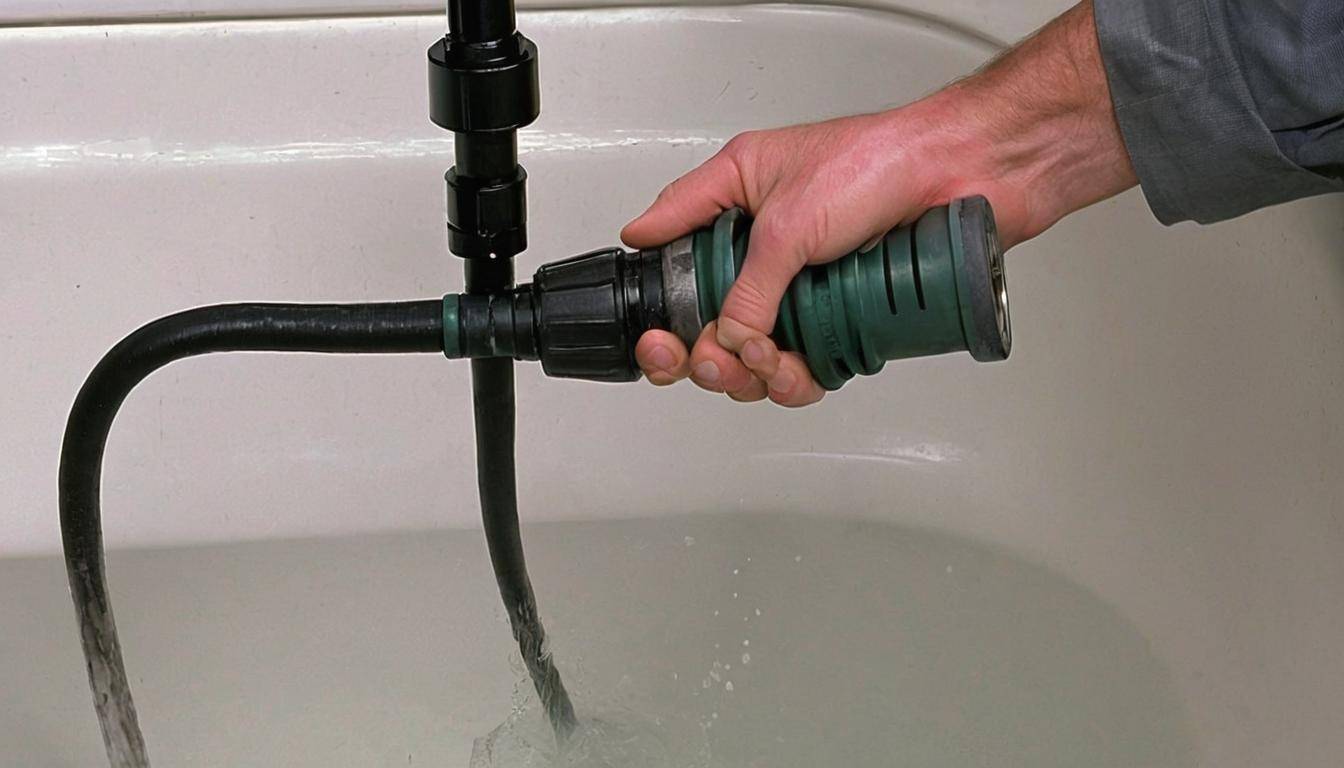
When it comes to unclogging drains without resorting to harsh chemicals or invasive methods, harnessing the power of pressure-based techniques can be quite effective. One of the most accessible options is the use of hot water flushing. The heat from boiling water aids in melting away grease and oil buildup—a common culprit for minor kitchen drain clogs. Just pour the boiling water down the drain slowly and steadily, allowing it to work its magic by loosening and flushing away the gunk.
Remember: Be cautious while handling boiling water and avoid using this method on PVC pipes or porcelain sinks as they may be damaged by extreme heat.
For more stubborn and resilient clogs, utilizing a sink or toilet plunger is a practical next step. The plunging action creates both pressure and suction, effectively dislodging and breaking up tougher clogs that resist simple hot water flushing. This method is particularly valuable for minor clogs and should be among the first DIY strategies employed before considering more invasive approaches like snaking.
A common issue with clogs in the bathroom sink is a buildup of hair and soap scum, which can often be resolved effectively using a plunger.
Hydro-jetting is another robust pressure-based solution that can address persistent and severe clogging issues. Unlike traditional plungers, hydro-jetting involves high-pressure water streams that are capable of removing even the toughest blockages by blasting them out of the drain. However, it’s important to note that hydro-jetting is best performed by professional plumbers due to the equipment’s power and complexity.
This method is especially useful for heavily clogged sewer lines or persistent blockages that are impervious to conventional plunging or snaking.
Considering the potential risks and complexities involved in hydro-jetting, reaching out to skilled professionals that is highly recommended. Their expertise and equipment enable them to perform hydro-jetting safely and effectively, ensuring thorough resolution of even the most stubborn drain blockages.
By exploring pressure-based methods such as hot water flushing, plunging, and hydro-jetting, you can address various levels of clogging issues without resorting to harsh chemicals or invasive techniques. These DIY solutions offer practical alternatives that are effective for different types of drain blockages.
Homemade Drain Cleaning Solutions
When it comes to dealing with clogged drains, you don’t always have to rely on harsh chemicals. Some of the most effective remedies can actually be found right in your kitchen. Let’s start with the classic combination of baking soda and vinegar.
Baking Soda and Vinegar
This dynamic duo creates a fizzy reaction that can help unclog a drain. Here’s how you can use them:
- Pour Half a Cup of Baking Soda: Pour half a cup of baking soda into the drain to absorb foul odors and loosen any grime causing a blockage.
- Follow with a Cup of Vinegar: Next, pour a cup of vinegar down the drain to initiate fizzing, which helps break up any gunk or buildup inside the pipe.
- Cover and Wait: Cover the drain to trap the fizzing action inside for about 15 minutes. The crackling or popping sounds are just the chemical reaction doing its job.
- Flush with Hot Water: After 15 minutes, flush the drain with hot water to clear away any remaining residue.
This remedy is particularly effective for minor clogs and is an eco-friendly alternative to commercial drain cleaners.
Salt and Hot Water
Another method involves using salt and hot water, additional kitchen staples that can come in handy when dealing with a slow or partially clogged drain.
- Equal Parts Salt and Baking Soda: Combine equal parts of salt and baking soda in a bowl.
- Follow with Boiling Water: Once mixed, pour the combination down the drain and follow it up with boiling water. The hot water dissolves grease and other buildup while the salt and baking soda work to scour away gunk clinging to the sides of the pipes.
Some might assume these natural remedies aren’t effective because they’re not as strong as commercial cleaners, but in reality, they can be just as powerful for minor clogs without posing any health risks or environmental harm. When these DIY solutions don’t work or if more serious issues arise, it’s best to seek professional assistance from our plumbing company who provides professional-grade solutions for all plumbing needs while promoting eco-friendly practices.
In your journey towards maintaining healthy drainage systems, knowledge isn’t the only tool you need. Next, we explore different gear and devices that can assist you in tackling clogs effectively.
Tools for Unclogging Drains
When it comes to dealing with a stubborn clog, having the right tools can make all the difference. Let’s explore some of the essential tools that can help you tackle even the toughest drain blockages.
Plungers
A plunger is a simple but effective tool for unclogging drains. It uses suction to dislodge clogs, making it perfect for dealing with basic blockages in sinks, toilets, and showers. The key to using a plunger effectively is to create a tight seal around the drain opening and use firm, rhythmic plunges to move the clog.
Drain Augers
Also known as plumbing snakes, drain augers are versatile tools that can reach deep into pipes to break apart stubborn clogs. They come in both handheld and motorized versions and are particularly useful for tackling more severe blockages that are out of reach for plungers.
Drain Claws and Drain Sticks
For surface-level clogs caused by hair and debris, drain claws or drain sticks can be highly effective. These tools are designed to grab onto and retrieve hair and other gunk that may be clinging to the walls of the drain pipe, helping to clear minor blockages before they become more serious issues.
Airburst Drain Cleaners
Airburst drain cleaners operate using compressed air to deliver a powerful burst that dislodges clogs deeper within the pipes. This method is efficient for reaching blockages that are not accessible with traditional plungers or snakes. However, caution should be exercised when using airburst drain cleaners to avoid injury or damage to pipes.
For instance, let’s say you’ve been experiencing slow drainage in your bathroom sink due to soap scum and hair accumulation. A combination of a drain claw and an airburst cleaner can effectively address the issue without resorting to harsh chemical cleaners.
It’s important to note that while these tools provide hands-on control and can clear basic to moderate clogs, severe or hard-to-reach blockages may require professional expertise. Advanced tools and specialized knowledge are often necessary to address complex drainage issues effectively—this is where the professional plumbers at My Calgary Plumber excel. Their wealth of experience and access to cutting-edge equipment ensure that even the most challenging drain clogs can be resolved efficiently and effectively.
With preventative maintenance being as crucial as having the right tools on hand for emergencies, avoiding drain problems altogether can save time, money, and hassle in the long run. Let’s now dive into some holistic methods for preventing common plumbing mishaps.
Preventative Maintenance Tips
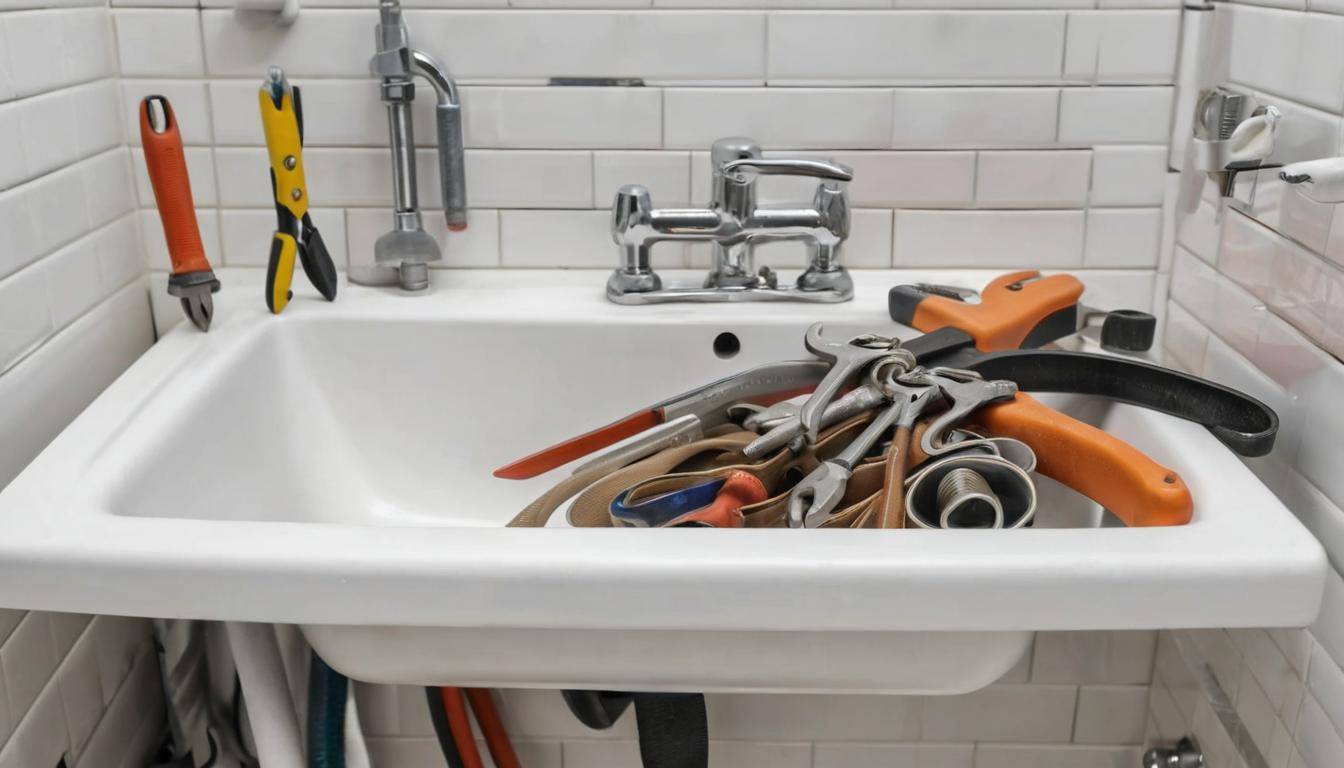
So, you’ve cleared your drains, but the real goal is to prevent them from getting clogged up again. Here are a few simple tips and practices you can adopt to keep your drains running smoothly and avoid the hassle of dealing with clogs in the first place.
Proper Waste Disposal
Grease and coffee grounds are some of the biggest culprits when it comes to clogged drains. When washed down the sink, these substances can solidify and create blockages. To prevent this, be mindful of what goes down your drain. Instead of pouring grease or coffee grounds down the sink, dispose of them in the trash. Making a small change in your routine can make a big difference in preventing clogs in your plumbing system.
Use Drain Catchers
Hair and food particles are also common causes of drain clogs. To trap these culprits and prevent them from going down the drain, consider using drain catchers or strainers. These simple devices can be placed over the drain opening to capture hair, food scraps, and other debris before they have a chance to cause a blockage.
Monthly Enzymatic Cleaning
Performing monthly maintenance using enzymatic cleaners is another effective way to prevent potential build-up in your drains. Enzymatic cleaners break down organic materials that could lead to clogs, keeping your pipes clear and free-flowing. This proactive approach reduces the likelihood of stubborn blockages and keeps your plumbing system in good shape.
Regular Hot Water Flush
Regularly flushing your drains with hot water can also aid in preventing accumulations, dislodging any small materials or residues clinging to the walls of the pipes, ensuring everything continues to move freely. It’s a simple yet effective method for maintaining clear and unobstructed plumbing lines in your home.
By adopting these practices, you can significantly reduce the risk of clogs and prolong the health of your plumbing system. If you need further guidance or personalized maintenance plans, don’t hesitate to reach out to My Calgary Plumber. They can provide expert advice tailored to your specific needs, helping you maintain clog-free drains and a well-functioning plumbing system in your home.


